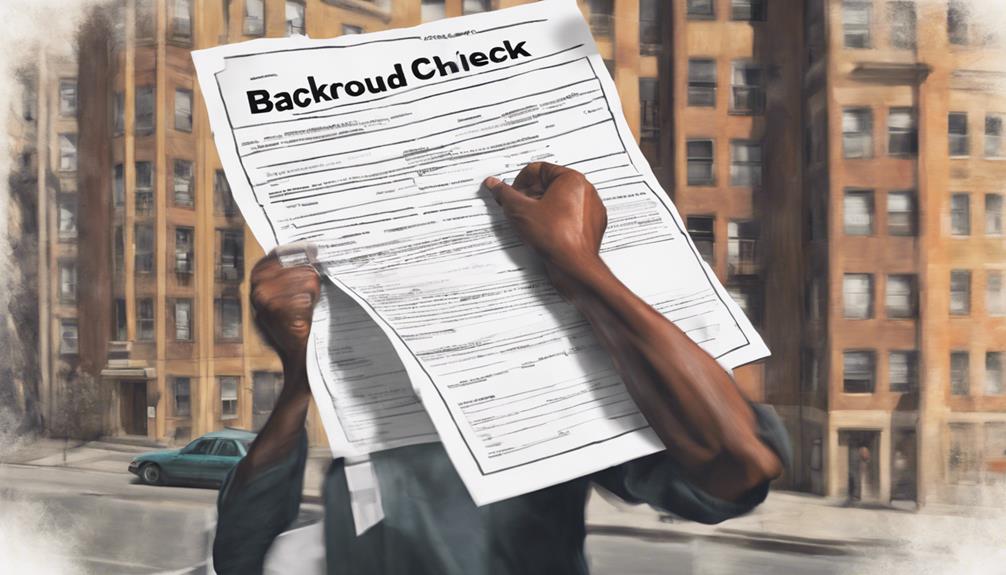Volunteer organizations must prioritize comprehensive background checks to guarantee safety, protect against risks, and uphold their reputation within the community. Maintaining a friendly and transparent approach during screening, fostering trust among volunteers, and providing clear guidance on specific checks are essential best practices. These steps not only safeguard vulnerable populations and assets but also secure compliance, risk mitigation, and theft prevention. By engaging volunteers through collaboration and empowering them through decision-making, organizations create a safe and welcoming environment. Adhering to volunteer background screening requirements is vital in maintaining a high standard of safety and security.
Key Takeaways
- Utilize comprehensive background check services for thorough screening.
- Establish clear screening policies to guide volunteers through the process.
- Ensure compliance with legal regulations for volunteer background checks.
- Communicate openly with volunteers about the specific checks being conducted.
- Regularly update volunteers on the status of their background checks.
Importance of Volunteer Background Checks

Volunteer background checks play a crucial role in safeguarding vulnerable populations from potential harm and reducing the risk of internal theft within organizations. For volunteer organizations and nonprofits, the importance of conducting thorough background checks can't be emphasized enough. Neglecting this vital step can expose these organizations to significant risks, including theft incidents that may go unnoticed.
With statistics indicating that 95% of companies experience theft and 10% are unaware of internal theft, the need for proper screening of volunteers becomes even more obvious. By prioritizing background checks, nonprofits can guarantee the safety of those they serve and protect their reputation from any potential harm caused by volunteers with malicious intentions.
Furthermore, conducting detailed background checks is essential for nonprofits to avoid liabilities associated with negligent volunteer screening processes. In light of the prevalence of internal theft within organizations, implementing stringent volunteer background checks is a proactive measure that can mitigate risks and safeguard the interests of volunteer organizations and the communities they serve.
Types of Volunteer Background Checks
Background checks for volunteer organizations encompass various types of screenings to safeguard the safety and integrity of individuals involved in the volunteering process.
Common types of volunteer background checks include criminal records checks, which are important due to the prevalence of theft and fraud incidents in companies.
Sex offender checks are particularly crucial for organizations working with vulnerable populations to confirm safety and compliance with regulations.
Working with children checks are critical for nonprofits serving youth, as neglecting volunteer screening can pose significant risks.
Identity checks play a crucial role in verifying the credibility of volunteers and protecting the organization's reputation.
Additionally, drug and health screenings are important to verify that volunteers are physically and mentally fit for their roles, contributing to maintaining a safe environment for all involved in the volunteering process.
Employing a thorough screening process that includes these various types of background checks is essential for volunteer organizations to mitigate potential risks and create a secure environment for both volunteers and those they serve.
Volunteer Background Check Best Practices

Implementing effective procedures to ensure the safety and integrity of individuals involved in volunteering is vital for organizations. Maintaining a friendly and transparent approach during background screening can greatly enhance the volunteer experience and engagement.
Being open about the types of checks conducted fosters trust and cooperation among volunteers. Regularly updating volunteers on the status of their background checks keeps them informed and involved in the process, promoting transparency.
Providing clear guidance on the specific checks being performed is essential in ensuring volunteers understand the requirements and feel supported throughout the screening process. By keeping volunteers well-informed and engaged, organizations can improve overall satisfaction levels and compliance with background screening policies.
These best practices not only contribute to a safer environment but also establish a positive and respectful relationship between organizations and their volunteers.
Nonprofit Considerations for Background Checks
Nonprofit organizations serving vulnerable populations must prioritize thorough background checks to safeguard their community and assets.
Volunteer screening and background checks for volunteers are essential for nonprofit organizations to guarantee compliance with legal requirements, mitigate risks, and prevent theft.
Neglecting proper volunteer screening procedures can expose nonprofits to significant liabilities, as many are unaware of internal theft issues.
With 95% of companies falling victim to theft, nonprofits can't afford to overlook the importance of background checks in protecting their reputation and maintaining a safe environment for volunteers.
Fortunately, there are free background check options available for nonprofits to utilize, aiding in the screening process to ensure that volunteers are safe and suitable for their roles.
Collaboration and Volunteer Management

Collaborating with volunteers in management processes cultivates a strong sense of community within organizations. By involving volunteers in decision-making, organizations can ensure that the volunteers' voices are heard and valued. This collaborative approach not only fosters a sense of belonging but also leads to better retention rates among volunteers. Utilizing collaborative tools and platforms can enhance communication and engagement, making volunteers feel more connected to the organization's mission.
| Volunteer Roles | Collaborative Approaches | Best Volunteer |
|---|---|---|
| Decision-making | Engaging volunteers through collaboration improves their experience and aligns them with the organization's vision. | Ensuring that the best volunteer is chosen for specific roles can be achieved through collaborative efforts. |
| Communication | Collaborative tools and platforms enhance communication with volunteers, keeping them informed and engaged. | Maintaining a safe environment for all volunteers can be facilitated through conducting background checks and screening processes. |
| Engagement | Empowering volunteers through collaborative decision-making can lead to higher engagement levels and a more dedicated volunteer base. | Screening and background checks are essential to ensure that the organization works with the best volunteers. |
Why Volunteer Background Checks Are Important
Safeguarding the safety and security of all individuals involved, volunteer background checks play a critical role in nonprofit organizations. Running background checks on potential volunteers is essential for maintaining a safe environment, especially when dealing with vulnerable populations such as children.
By screening volunteers, organizations can identify any red flags that may indicate a risk to the community or other volunteers. Compliance with legal requirements is a significant factor driving the importance of volunteer background checks. Nonprofit organizations must adhere to Child Protection laws and other regulations, making thorough background screenings a necessity to meet these standards.
Establishing standardized screening processes through background checks helps organizations minimize risks and ensure a secure environment for all stakeholders. Moreover, conducting volunteer background checks promotes fairness and transparency in the volunteer management process.
Volunteer Background Screening Requirements

Prioritizing volunteer background screening is vital to maintaining a safe environment for all individuals involved in nonprofit organizations. Different types of volunteer roles may require varying levels of background checks to secure the safety and security of everyone within the organization. Some positions, such as hospital volunteers working closely with patients, often mandate thorough background checks to protect the well-being of those they serve. Specific policies set by organizations like Portland Public Schools and District of Columbia Public Schools highlight the importance of background screening for volunteers interacting with vulnerable populations. State laws further complement federal regulations by regulating record retention and access to criminal records, enhancing the overall screening process. It is important for nonprofits to conduct background checks to safeguard their clients and maintain trust within the community. Below is a table outlining key aspects of volunteer background screening requirements:
| Volunteer Background Screening Requirements |
|---|
| Background check services |
| Run volunteer background checks |
| Guide to Volunteer |
Frequently Asked Questions
Why Are Background Checks Important for Volunteers?
Ensuring safety and preventing risks, background checks are essential for volunteers. They safeguard against theft, liabilities, and reputational harm in nonprofits. Upholding safety standards, these checks are fundamental for protecting the community and organizations.
Which Two Types of Background Checks Are Most Commonly Used by Organizations?
Criminal background checks and sex offender registry checks are the two most commonly used types of background checks by organizations. They play a vital role in ensuring safety and security for volunteers and the community they serve.
What Factors Should Be Considered When Conducting a Background Check?
When conducting a background check, organizations should consider the volunteer's role, level of interaction with vulnerable populations, legal requirements, access to sensitive information, potential risks, and past experience to guarantee suitability and safety.
Which of the Following Should Be Considered When Conducting a Background Check?
When conducting a background check, organizations should consider the volunteer's role, legal requirements, provider reliability, cost-effectiveness, and maintaining transparency with volunteers. These factors help guarantee thorough screenings that balance safety and budget constraints.
What is the Recommended Timeline for Keeping Background Checks for Volunteer Organizations on File?
For volunteer organizations, it’s crucial to know the recommended length of background checks to keep on file. Typically, it’s advised to retain these checks for at least five years. This ensures that the organization has access to important information if needed, while also abiding by legal standards for record-keeping.
Conclusion
To sum up, implementing volunteer background checks is essential for ensuring the safety and security of both volunteers and those they serve.
By following best practices and collaborating with volunteer management teams, nonprofit organizations can create a safer environment for everyone involved.
Remember, background checks are a necessary step in protecting the vulnerable populations that volunteer organizations aim to support.









